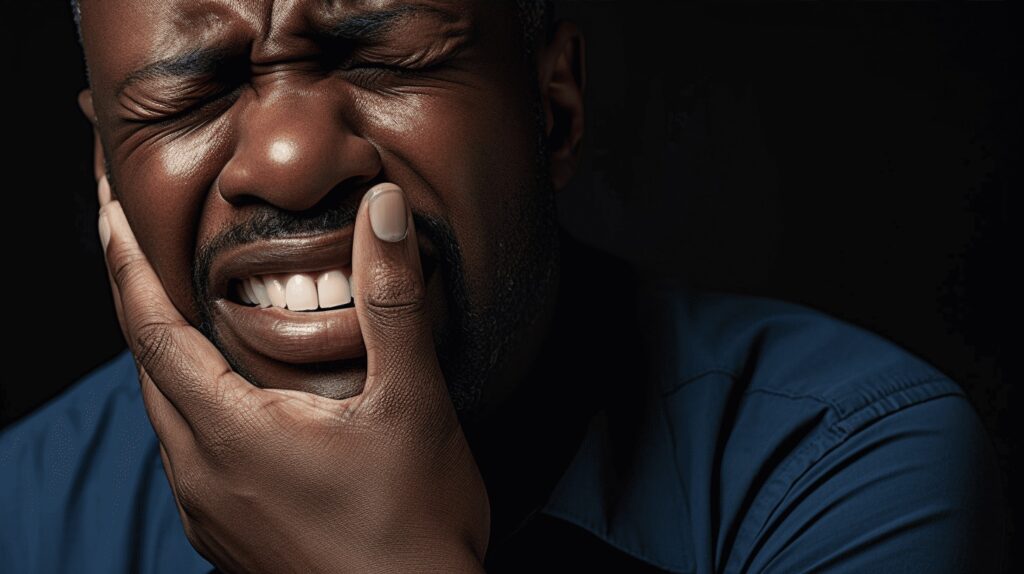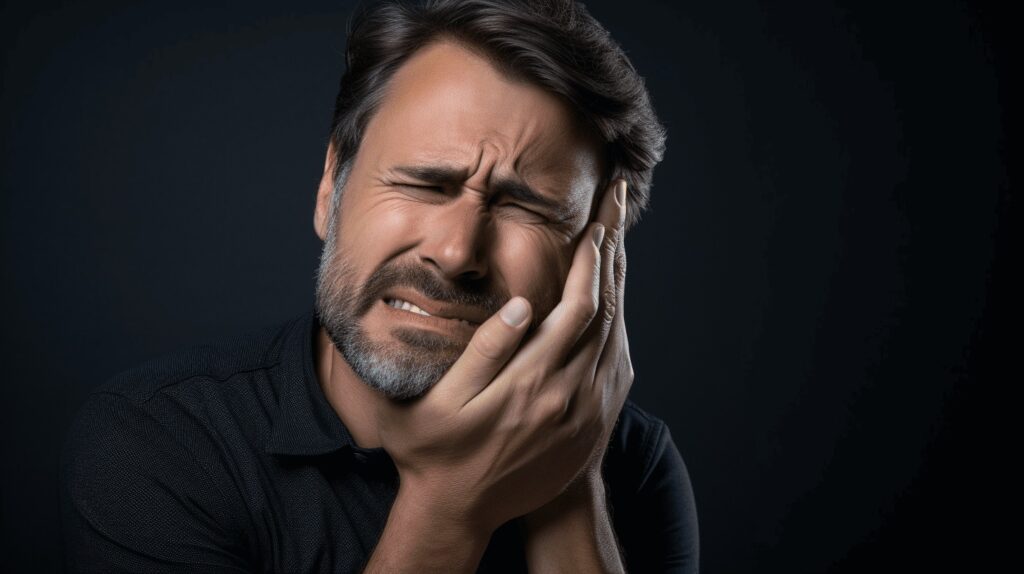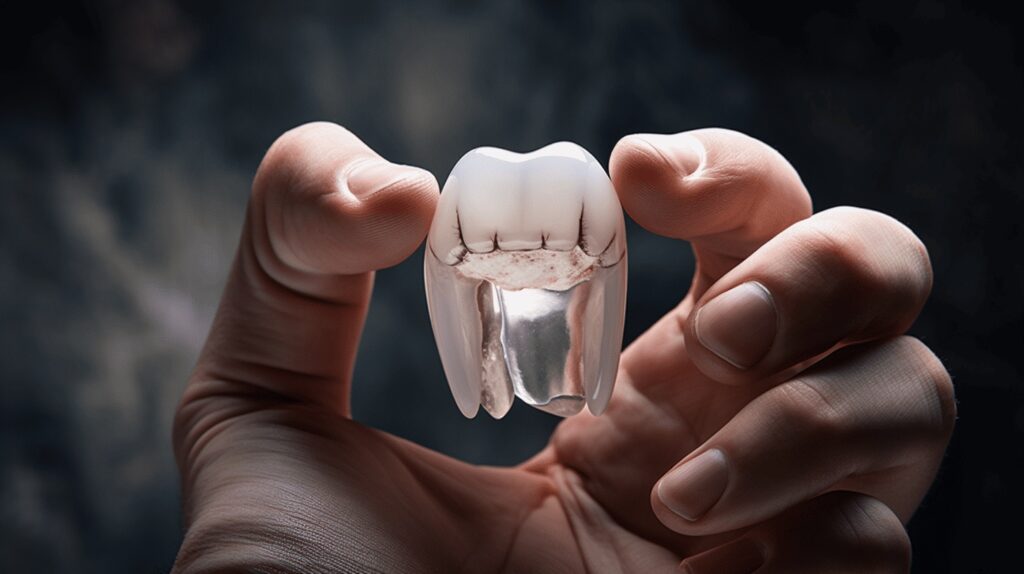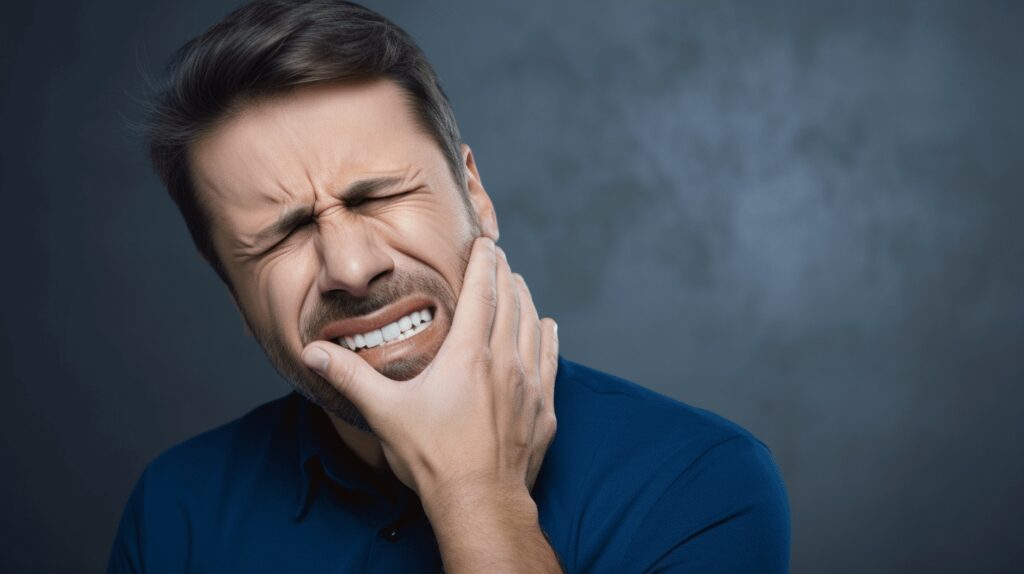Who among us hasn’t taken a bite into a hard piece of food and felt that heart-stopping crunch that signals something much worse than a mere chipped tooth? Yes, we’re talking about that notorious villain of the dental world – a cracked tooth! 😱
Do you know the steps to take when faced with a cracked tooth? No? Well, that’s where we step in. In this insightful article, we explore the fascinating (but admittedly a bit discomforting) world of cracked teeth. Grab a cup of tea ☕ (nothing too hot or cold, we’re talking about sensitive teeth here!) and join us as we delve deep into what it means to have a cracked tooth, how to spot one, home remedies to manage discomfort, and when it’s time to get professional help.
By the end of this, you’ll be armed with all the necessary knowledge to handle a cracked tooth situation. So let’s pop on our imaginary white coats, switch on that dental chair light 💡, and, brace ourselves – it’s time to take a closer look inside our mouths!
Table of Contents
Understanding a Cracked Tooth
Just think of the discomfort and pain that comes with biting down on a piece of hard candy, only to feel a sudden sharp pain. 😭 You might have a cracked tooth, and it’s more common than you think. In this article, we are about to discover the intricacies of this rather unpleasant dental condition and carve out the mystery surrounding the types and causes of a cracked tooth.
According to the American Association of Endodontists, many people have cracked teeth and don’t even realize it. This is typically because the cracks are invisible to the naked eye and might not show up on X-rays. Yet, it’s crucial to identify and treat them early to save the tooth and prevent further complications.
Types Of Cracked Teeth
You might be surprised, but not all cracked teeth are the same. Teeth can be cracked in different ways, and each type comes with its unique set of challenges and treatment nuances:
- Craze lines: These are tiny cracks only affecting the outer enamel of the tooth. It is the least severe type and generally doesn’t require treatment. 🦙
- Fractured cusp: This happens when a piece of a tooth’s chewing surface breaks off, often around a filling. It’s generally not very painful and can be treated easily.
- Cracked tooth syndrome: This type of crack extends from the chewing surface down towards the root. In some cases, it may even reach the root. This type often requires comprehensive treatment, which might include a root canal or even extraction.
Causes of Cracked Teeth
As much as we wish otherwise, our teeth aren’t invincible, and several factors can lead to them getting cracked. Some typical culprits include:
- Chewing or biting down on something hard: Foods like ice, or non-edibles like pen-tops, pencils, or fingernails, can put a great deal of pressure on our teeth and cause them to crack.
- Age: Unfortunately, teeth become more susceptible to cracks as we age. Most people who suffer from this condition are aged between 50 and 60.👴👵
- Large fillings: Fillings that are too big weaken the integrity of the tooth, making it more prone to cracks.
Remember, early detection of a cracked tooth can help salvage the situation before it spirals out of control. So, if you’re experiencing discomfort or sudden pain whilst eating or drinking, it might be wise to book an appointment with your dentist sooner rather than later. Your path to relief and recovery might just be a check-up away! 😃
Signs and Symptoms of a Cracked Tooth
Ever experienced a sharp, sudden pain while munching on your favorite snack? Or perhaps, a unexpected discomfort while sipping a cold drink? While it might be easy to dismiss these as momentary discomforts, they might be signaling at a more serious problem: a cracked tooth.
A cracked tooth can happen a lot easier than you may think. Over time, your teeth are under constant stress. You use them to bite, to chew, and sometimes, as a tool to tear open packaging. Such continuous stress can take a toll, sometimes causing them to crack.
Being aware of the signs and symptoms can help you take prompt action and prevent further complications. Here are the top indicators of a cracked tooth that you should never ignore:
- Sharp Pain: This could be a sharp, sporadic pain while chewing or biting. The pain typically comes and goes, and it might be challenging to determine exactly which tooth is causing the discomfort.
- Sensitivity: A cracked tooth may cause heightened sensitivity to hot, cold, or sweet foods and drinks.
- Swelling: In some cases, a cracked tooth can lead to swelling of the gum around the affected tooth.
- Discomfort while Eating: You may experience discomfort or pain when releasing biting pressure, not just when applying it.
- Visible Cracks or Chips: Although not always visible to the naked eye, sometimes you might be able to see or feel the crack in your tooth.
A cracked tooth can cause many problems if not treated promptly. Beyond these symptoms, it may lead to a severe infection or the loss of the tooth. That’s why, if you notice any of these signs, it’s vital to book a dental consultation immediately.
However, do remember that these symptoms can also be indicative of other dental problems. So, while they serve as warning signs, it’s crucial to get a professional diagnosis from a competent dentist.
In any case, being informed is the first step. As we always say, the key to maintaining good oral health is prevention. Regular dental check-ups, eating a balanced diet, and maintaining a thorough oral hygiene routine are all excellent strategies to keep dental problems at bay.
Immediate Actions for Managing a Cracked Tooth
Experiencing a cracked tooth can feel like a minor apocalypse. Not only is it painful, but knowing how to handle it can also increase your anxiety levels. Alright, deep breaths everyone! 🧘♀️ Panic is not on the menu today. What we have instead is a list of immediate actions you can take if you have a cracked tooth.
- Don’t Panic: Yes, we know this sounds easier said than done, but staying calm is your best bet in managing the situation. Besides, panicking won’t un-crack the tooth, will it?
- Rinse: Rinse your mouth with warm (not hot!) salt water. This method is an oldie but a goodie for a reason. It can help clean the affected area and soothe the pain you might be encountering.
- Limit Use: Try not to chew using the side of the mouth affected by the cracked tooth. This not only prevents further damage to the tooth but also reduces the discomfort it might cause.
- Seek Professional Help: This might be the most critical step of all. Make an appointment with your dentist as soon as you can. A cracked tooth, if left unattended, can lead to more complicated issues that we’d probably like to avoid.
We’ve presented immediate actions like the Jedi Masters of dental care we are. However, please note that these are temporary solutions and not a substitute for professional dental treatment. A cracked tooth demands the expertise and intervention of your friendly neighborhood dentist (friendly web-slinger skills not mandatory).
So, the next time you’re grappling with a cracked tooth, remember to stay cool, rinse, avoid using the affected side and dial your dentist. That nagging pain won’t stand a chance against such proactive measures! 🦸♂️👄🦷💪
“It’s not the years, honey, it’s the mileage.” This quote from Indiana Jones finds an uncanny resonance with any dental issue, especially a cracked tooth. The wear and tear can catch up to us, but with a quick response and professional help, we can manage “toothcracks” much better.
We’ll leave you with this quote attributed to actress Carrie Fisher, “Take your broken heart (or tooth, in this case), make it into art.” While you might not sculpt a masterpiece from your dental issue, treating it like an art project that demands immediate and careful attention can sail you smoothly through it!
Home Remedies to Reduce Discomfort
We all know how irritating it can be to get through the day with a nagging discomfort plaguing us. It could be a mild headache, a stomach upset, or even a sprained ankle. The natural response to these ailments, of course, is to turn to over-the-counter medication. But did you know there’s another way out? Yes, with a little tweak in your daily lifestyle, you might just be able to mitigate these niggles. Let’s explore some handy home remedies we can easily apply to reduce discomforts.
Headaches
There’s possibly nothing more annoying than a continuous headache. Whenever you’re pinned down with one, try using some of these natural remedies:
- Stay Hydrated: Dehydration is often a major cause for headaches. Drinking ample water regularly can prevent and alleviate headaches.
- Gentle Stretch: Gentle stretching exercises, especially for the neck, shoulders, and upper body, can help relieve the tension that results in headaches.
- Green Tea: Sip on some green tea – it has antioxidants that can alleviate pain and inflammation that cause headaches.
Remember, while these remedies may help relieve discomfort, they should not replace professional medical advice, especially for persistent or severe ailments.
Digestive Discomfort
Stomach problems like gastric, constipation, or indigestion can be extremely uncomfortable. Try these easily available remedies:
- Ginger: Known for its anti-inflammatory properties, Ginger can soothe the stomach and support digestion.
- Stay Active: Physical activity can help move the foods you’ve eaten, preventing constipation and gastric problems.
- Hydrate: Just like for headaches, staying well-hydrated can aid digestion and prevent discomfort.
Sprains and Strains
If you’ve sprained a muscle while working out, or perhaps simply twisted your ankle, you can try these:
- Rest: Often, the best cure for sprains is rest. Allowing the sprained muscle to relax helps it recover faster.
- Ice Packs: Applying an ice pack to the affected area can reduce swelling and pain.
- Compression: Wrapping a bandage around the sprained area can provide support and prevent further injury.
While these remedies can ease day-to-day discomforts, always keep in mind that serious symptoms necessitate a visit to the doctor. Home remedies are excellent preventive measures and first-response treatments, but they cannot substitute for professional medical intervention. Stay open to both, and you’ll experience smoother, stress-free days!
When to Seek Professional Dental Care
Visiting a dentist is sometimes postponed or considered unnecessary until a serious problem occurs. However, just like your overall physical health, your oral health plays a significant role in your well-being. Ideally, routine check-ups should be scheduled every six months to ensure clear dental health. But when is it absolutely necessary to seek professional dental care? Let’s explore this together.
Recognize The Symptoms 🕵️♀️
Typically, there are a few warning signs that your teeth and gums are in dire need of a dental visit. We’ve listed these below:
- Persistent bad breath or a bad taste in the mouth.
- Swollen, tender, or bleeding gums.
- Painful or sensitive teeth.
- The occurrence of mouth sores or patches.
- Trouble swallowing or chewing.
These symptoms should not be ignored, as they may be indicative of more serious underlying dental health problems. So, when you notice any of these signs, it’s high time to give your dentist a call.
Regular Check-ups Are Essential 👩⚕️👨⚕️
Just like your annual physical check-up, keeping up with your dental health is equally important. Regular visits to your dentist can help identify potential problems early, even before you start feeling any discomfort or pain. Regular check-ups include a thorough cleaning and a close inspection of the mouth, teeth, and gums to check for signs of disease or other problems.
“An ounce of prevention is worth a pound of cure.” – Benjamin Franklin
This adage perfectly applies to our dental well-being too. Maintaining regular check-ups benefits our overall health by preventing minor issues from escalating into major problems which are both expensive and painful to treat.
Why You Shouldn’t Delay a Dentist Visit 🚫⏳
You may feel like it’s only a tiny cavity or a minor gum discomfort, and postpone your dental visit, but trust us when we say, “a small dental issue can quickly escalate”. With our mouths being a significant entry point into our digestive and respiratory tracts, our dental health directly impacts our systemic health.
To put it simply, taking care of our oral health is imperative for our overall health. If we ignore the telltale signs of dental issues, we put ourselves at risk for heart disease, diabetes, and other serious illnesses. So, whenever you’re pondering if you should call your dentist, the answer is quite likely: yes!
To sum it up, taking care of your teeth and gums on a regular basis is a cardinal rule you should follow. Listen to your body and mind its signals. After all, a healthy smile is always in style! Keep sparkling! ✨
Preventing Cracked Teeth
Taking care of your teeth is a non-negotiable part of maintaining overall health. In addition to giving you a radiant smile, healthy teeth make eating more enjoyable, boost your self-confidence, and save you from discomfort (or even pain) associated with dental issues. When it comes to dental problems, one condition you’d definitely want to avoid is cracked teeth. It can be a real bummer, affecting your eating habits, spoken language, and not to mention, leaving a constant nagging pain in your mouth. 🛑 But, don’t worry! We’re here to guide you towards a healthier, happy smile by demonstrating some effective preventative measures for cracked teeth.
Maintaining Good Dental Hygiene 🦷
Kick-starting our list is the golden rule of dental health—maintaining good dental hygiene. This is not a hyped-up cliché but a solid fact that professionals across the globe stand by. Brushing twice a day, flossing regularly, and using an antimicrobial mouth rinse can keep teeth strong, reducing the chance of them getting cracked. Make sure to replace your toothbrush every three to four months or earlier if the bristles start to fray.
Using Mouthguards During Contact Sports 🛡️
Calling out to all sports enthusiasts 📣! Contact sports like football, hockey, and boxing can sometimes lead to accidental blows to the face, causing broken or cracked teeth. Even non-contact sports like skateboarding or gymnastics pose similar risks. Using a mouth guard during these activities can protect your teeth from damage. It’s a small investment towards a big relief, don’t you think?
Avoid Chewing on Hard Objects 🚫
Do you have a habit of chewing on pens, ice, or popcorn kernels? Well, it’s time to say goodbye to this habit. Constantly chewing on such hard objects can cause the teeth to crack. Even seemingly harmless things like using your teeth to open bottle caps (yes, we know some of us are guilty of it 🙈) should be avoided.
Regular Dental Check-Ups 🩺
One of the most effective ways to prevent cracked teeth is by getting regular dental check-ups. Dentists can detect early signs of tooth decay or cracks that we might miss, helping us prevent larger issues down the line. They say, “Prevention is better than cure,” and we couldn’t agree more.
Just remember, caring for your teeth is as essential as caring for any other part of your body. By following these preventative measures, you can protect your teeth from getting cracked, ensuring they stay in ‘mint’ condition for years to come! 😊
Conclusion
Taking proactive steps, possessing awareness about your dental health, and seeking timely attention from dental professionals can help in effectively managing a cracked tooth. A cracked tooth can seem daunting, but remember, it’s not the end of your beautiful smile!
At Wilshire Smile Studio, we cater to your dental emergencies with immediate and comprehensive care, ensuring your smile remains bright and healthy. Whether you’ve experienced a cracked tooth, or are seeking preventative services to avoid one, our diverse team of experienced professionals is ready to provide customized solutions. Give us a call at (323) 336-8478 to learn more about how we can cater to your dental health needs, or you may schedule a visit with us.
Cracked teeth happen, and when they do, your partners at Wilshire Smile Studio are here to ease your pain and restore your confidence. With us, rest assured, you are always in safe hands. Remember, your healthy, stunning smile, is just a click away.
Frequently Asked Questions
-
- What should I do if I have a cracked tooth?If you have a cracked tooth, it is important to rinse your mouth with warm water, apply a cold compress to reduce swelling, and take over-the-counter pain medication. You should also schedule an appointment with a dentist as soon as possible.
-
- Can a cracked tooth heal on its own?No, a cracked tooth cannot heal on its own as the enamel and dentin layers of a tooth don’t have the ability to regenerate. It is essential to seek dental treatment to prevent further damage and alleviate any pain or sensitivity.
-
- What will the dentist do for a cracked tooth?The treatment for a cracked tooth depends on the severity. The dentist may recommend dental bonding, a dental crown, root canal therapy, or tooth extraction. They will evaluate the crack and determine the most appropriate course of action.
-
- How can I prevent a cracked tooth?To prevent a cracked tooth, it is advisable to avoid chewing on hard objects like ice or hard candy. Additionally, wear a mouthguard during sports activities, maintain good oral hygiene, and visit your dentist regularly for check-ups and professional cleanings.
- Is a cracked tooth a dental emergency?Yes, a cracked tooth is considered a dental emergency. Even if it does not cause immediate pain, it requires prompt attention from a dentist to prevent further damage or infection. Contact your dentist as soon as possible to schedule an emergency appointment.









